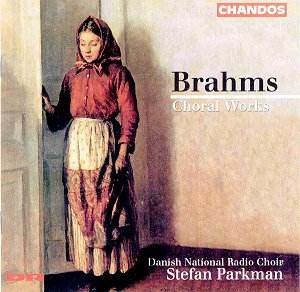BRAHMS Choral Works
 Danish National Radio Choir
- Stefan Parkman Bengt Forsberg - piano *
Danish National Radio Choir
- Stefan Parkman Bengt Forsberg - piano *
 Chandos CHAN 9806 digital
- full price - made in conjunction with Danish Radio [62.00 ]
Chandos CHAN 9806 digital
- full price - made in conjunction with Danish Radio [62.00 ]

1. Drei Gesang, Op. 42.
2. Fünf Gesänge, Op. 104
3. Vier Gesänge, Op. 17
4. Sechs Quartette, Op. 112 *
5. Ziegeunerlieder, Op. 103 *
This is the second issue by Chandos in their Brahms Choral Works series and
it follows the quality of the first disc - stylish, very secure intonation,
first class recording quality and excellent presentation. The earlier disc
was identified as Volume One, but the present is just titled Brahms Choral
Works. If this means that an extended series is no longer planned, this would
be a pity as the overall quality of this disc is well worth continuing.
The Op. 42 songs are for six part unaccompanied chorus and the textures are
actually earlier works than the opus number would suggest. They also exhibit
a quality of Brahms' choral writing in that they are written in six parts
- i.e. in fact a makeshift double choir. In Abendständchen, for example,
the two choral strands perfectly imitate the effect of the monotony of the
solo flute, filling the night against the sound of the spring. Brahms' interest
in older music is here - evoking memories of Gabrieli. In the second song,
Vineta, covers the comparison of the lost, drowned city to drowned, lost
love. There is a piano part (omitted here) which does not contribute greatly
to the song which is not a great loss, given the quality of the singing here.
In the last, Darthulas Grabegesang there are great contrasts, again as a
result of the antiphonal male / female harmonies and a remarkable writing
for double chorus ranging from bare unisons to full six part harmonies.
The Op. 104 pieces are similarly superbly sung, with the Chandos recording
supporting and enhancing the quality of the choir. The content of these songs
is almost consistently despondent, and this brings out in Brahms an exquisitely
romantic style of writing, which is perfectly realised by Stefan Parkman
and his choir.
Next comes the Opus 17 songs, and in this case with supplementary accompaniment
from harp played by Catriona Yeats, and horns played by Per McClelland Jakobsen
and Leif Lind. Brahms wrote these choruses in 1860 for his Hamburg ladies
choir. The added instrumental colour supports the very romantic character
of these works, evoking the effect of forest mystery (horns) and the forest
breezes (harp).
In the Sechs Quarttete, Op. 112, we come to the first surprise of the disc
as these pieces were originally written for four solo voices. Here we have
the choral version, which has been recorded by others before. Comparing these
works with the solo versions, I must say that I preferred the present offering,
and look forward to more of the same. There is a lushness which the solo
voices cannot possibly evoke, and I found these pieces to be very satisfying.
These were Brahms' final works for vocal ensemble and they were produced
in two sections. The first two songs are based upon views of nocturnal depression
written by Franz Kugler. They were perhaps the most severe pieces Brahms
ever wrote for vocal ensemble. As if to counteract the gloom, the four remaining
songs in the group are all light hearted gypsy songs, maybe left over as
unfinished business from the Op. 103 set of Zigeunerlieder.
Finally we have another group of songs, the Zigeunerlieder Op. 103, sensitively
accompanied by Bengt Forsberg at the piano. These songs were also originally
written for four part solo voices, and the choral versions are admirable.
The choir brings out the jollity and high spiritedness of the songs and these
make a fitting and highly enjoyable conclusion to a very satisfying CD -
highly recommended.
Reviewer
John Phillips


![]()